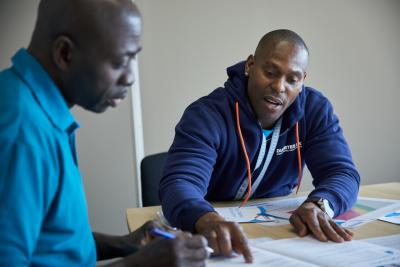People from Black African, African Caribbean and South Asian (Indian, Pakistani, Bangladeshi) backgrounds are at a higher risk of developing type 2 diabetes from a younger age.
Research has shown that there are several risk factors linked to this, some that you can manage and others that you can’t. Type 2 diabetes is serious and can go undetected for up to 10 years. It is not inevitable and in many cases can be prevented or delayed. If you do nothing, you could end up with some serious complications.
"My mum, grandma, grandfather, aunties and uncles all have type 2 diabetes. I was always aware that I was high risk because of that, so I decided to take the Know Your Risk test and my results came out as high risk."
Asad took steps to change his habits and live better, after realising he was at high risk of type 2 diabetes.
Risk factors of type 2 diabetes
When we talk about what makes us at risk of developing type 2 diabetes, we call them risk factors. We mean things like:
- Age
- Weight (and your waist size)
- Ethnicity
- Having a close relative with diabetes.
If you're worried about your risk and want to take action, try our Know Your Risk tool. You’ll have to answer a few simple questions and you will find out what your risk of developing type 2 diabetes is. Depending on your score, the next step may be asking your GP for a blood test.
Diabetes information in other languages
We've got lots of information available to download or order in languages other than English.

Ethnicity and type 2 diabetes
You might be wondering exactly why your ethnicity increases your risk of type 2 diabetes. Family history, and social and environmental factors play a part. But it is still not clear why people from certain ethnic backgrounds have an increased risk.
What do we know? People from South Asian backgrounds for example are more likely to experience insulin resistance at a younger age. This could be linked to how fat is stored in the body and particularly around the middle. This is known as visceral fat and it can build up around important organs like the liver and pancreas. Having too much of this type of fat is just one of the factors that can affect your health and increase the risk of type 2 diabetes.
Insulin resistance is when insulin can’t work properly leading to an increased chance of having high blood sugar levels. If left untreated over time, high blood sugar levels can lead to lots of health complications. The good news is that by getting into some healthier habits, such as becoming more active and eating healthy foods, you can reduce your risk.
Age and ethnicity
People from Black African, African Caribbean and South Asian backgrounds are at risk of developing type 2 diabetes from the age of 25. This is much younger than the white population, as their risk increases from 40. We still don’t know exactly why this is but taking steps towards leading a healthier lifestyle could help lower your risk.
Reducing your risk
The changes you make don’t have to be big, dramatic changes to the way you live. Things like walking a bit more every day can help – check out our walking events to help you get started.
Making healthier food choices, such as eating more fruit and vegetables, choosing wholegrains, including some yogurt and cheese in your diet and having less processed foods can all make a huge difference to your risk level. Maintaining a healthy weight is especially important if you are at risk of developing type 2 diabetes. Carrying extra weight, is the biggest risk factor for type 2 diabetes.
If you’re looking for inspiration for some healthier meals, that are still packed with flavour, why not give some of these a go?
- Jollof rice
- Curried spinach with red onion
- Vegetable chow mein
- Fufu with chicken pepper soup
- Channa dahl
- Power porridge
There are lots of changes you can make yourself, like cooking meals at home instead of eating out or ordering takeaways. You could also try swapping to healthy fats such as olive oil instead of ghee. Why not try taking tea and coffee without sugar and having one or two days per week where you eat a vegetarian meal, instead of meat?
We're doing more research to understand why people from certain ethnic minorities have a higher risk of developing type 2 diabetes. In the meantime, find out what else you can do to reduce your risk.
